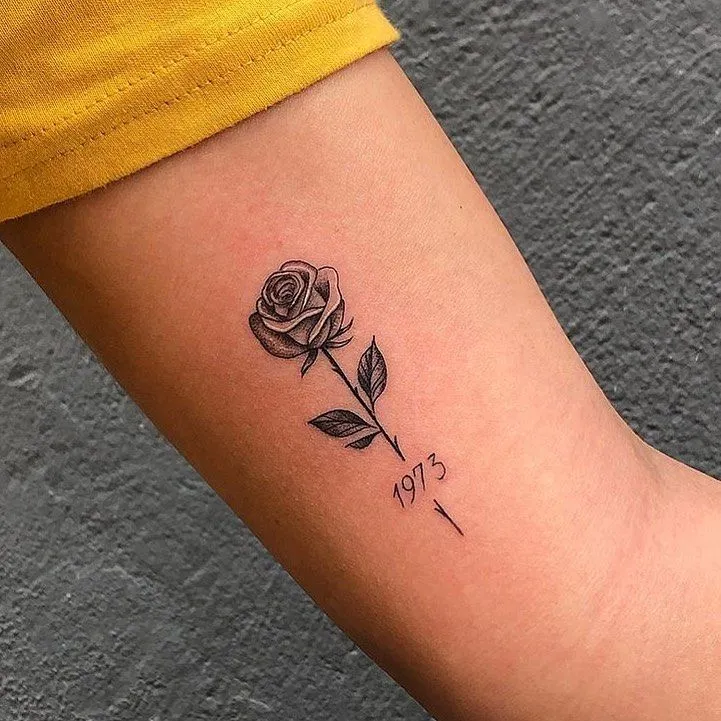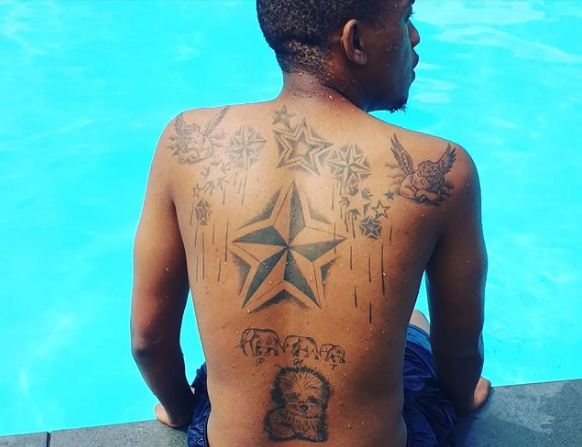This surprised many viewers, as they had never imagined Katlego to have tattoos.
To begin with, they are always concealed on Skeem Saam, and he is always portrayed as a charming, nearly flawless young man.
He claims he will one day explain the significance of his tattoos.
Patrick Seleka admits to having abused his wife Mmabaneng Seleka in the past.
Seleka admitted and apologized on Instagram claiming he was the primary cause of his wife’s sadness.



Mmabaneng, Seleka’s wife, had previously posted on social media about her depression, which raised a few eyebrows. Seleka opened up.
“I am the cause of my wife’s depression,” he captioned his now-deleted social media video.
“I am primarily responsible for my wife’s depression; in fact, I should say I am solely responsible. I am the reason she has been depressed for such a long time, and the worst part is that I have not been there for her. He stated, “I was emotionally and mentally abusive to her.”
He stated that he was not pleased with way he treated his wife and that he would not treat her in such a manner with her worst enemy.
“I have put my wife in a position that I wouldn’t want even my worst enemies to be in, and I am publicly apologizing to her – wherever she is at this moment – and her family for all that I have done, and I will do my best to make things right for her,” Patrick said.
This was not the first time he had discussed his wife’s mistreatment. He publicly apologized to his wife for, among other things, coming home drunk, body-shaming her, and cursing at her.
I apologize for body shaming you. I apologize for calling you a name. I apologize for cursing at you. I apologize for the comparison. I apologize for disparaging you in an attempt to conceal things. I apologize for yelling and screaming at you. I apologize for coming home intoxicated and starting a fight with you for no reason.
I apologize for cheating numerous times. I apologize for making fun of you and saying “oh shame, if only she knew” to other women. I apologize for destroying everything for you. I apologize for ruining your friendships. I apologize for not being present for you.
“I apologize for not being the gentleman I promised you I would be. I’m sorry for all the times you’ve wept yourself to sleep while I was standing right next to you and did nothing. I’m sorry that I caused your depression and forced you to take antidepressants. I apologize for being a monster, not only to you but also to our children. I apologize for my mental, emotional, and verbal abuse of you. “I’m sorry, Mmabaneng,” the actor said.
What the law in South Africa says about tattoos in the workplace
In general, South African courts have sided with the employee when an employer’s policy restricts a certain appearance.
What the law in South Africa says about tattoos in the workplace
According to employment law experts at Cliffe Dekker Hofmeyr, neither the South African Constitution nor the Employment Equity Act prohibits appearance-based discrimination on the basis of tattoos.
Therefore, if an employer challenges a worker for having a tattoo, the worker must assert one of the aforementioned grounds.
The legal firm stated that an employee would have to claim that personal appearance should be protected under freedom of expression or personal dignity.
The discussion around tattoos in the workplace has been triggered by recent remarks made by the minister of police, Bheki Cele, who stated that the police force does not hire persons with tattoos because they associate with gangsters.
“We don’t recruit people with tattoos because they have a tendency to be gangsters,” stated Cele.
According to Cliffe Dekker Hofmeyr, tattoos are mutable characteristics, which means they do not automatically qualify for legal protection and are typically addressed in an employer’s dress code and grooming standard.
It was stated that South African courts have reinforced their commitment to the ideals of dignity, freedom of religion, opinion, and expression, and equality over constraints on an individual’s physical appearance. This is evidenced by South African legal decisions that have rejected the international approach to appearance discrimination.
The following three cases confirmed the court’s stance on workplace appearances:
In IMATU v. City of Tshwane Metropolitan Municipality, the court decided that, in the case of two female metro police officers who refused to shave their hair, individual expression trumped commercial needs, rendering the training agreements unconstitutional;
In Department of Correctional Services v. POPCRU, the court ruled that if an employee’s hairstyle does not interfere with their ability to perform their work, then a policy compelling them to modify their haircut could violate their rights to religion and free speech.
In Dlamini v. Green Four Security, despite recognizing that the policy requiring trimmed beards was an intrinsic condition of the employment, the court emphasized the significance of regulations being distinct with regard to the Constitutional rights of employees.
Cliffe Dekker Hofmeyr stated that even though South African law does not explicitly protect against discrimination based on a person’s tattoos, the courts have generally sided with the employee where a policy restricts a chosen appearance that is tied to religion, expression, or dignity.
As such, the minister’s comments, if implemented, might be deemed discriminatory and so illegal if challenged based on a constitutional right or the requirements of the Labour Relations Act 66 of 1995.